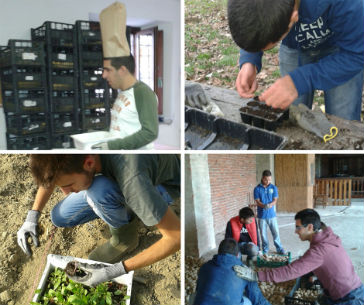Spotlight Interviews with Cooperators
Italian social cooperatives working together for the benefit of the communities
"Spotlight Interviews with Cooperators" is a series of interviews with cooperative leaders from around the world with whom ILO officials have crossed paths during the course of their work with cooperatives. In this issue ILO interviewed Ms Vittoria Burton, Head of Research and Development of Consorzio Copernico in North-West Italy. Prior to joining Consorzio Copernico in 2015, she worked at one of the six cooperatives constituting Consorzio Copernico as Chair and Educational Coordinator from 1997 to 2015.
Q. What is Consorzio Copernico?

In Italy, social cooperatives are organized under two types, A and B. Three of Copernico's cooperatives are Type A cooperatives: they produce educational and social welfare services for children, adolescents, families and, more recently, immigrants and asylum seekers. The other three cooperatives are Type B cooperatives, with the main objective of providing job opportunities to people who need a sheltered work environment, for example people with learning difficulties or disabilities, people who have addictions, offenders who are given the chance to work outside prison, or long-term unemployed people. Type B cooperatives operate in social and agricultural sectors, and catering and industrial cleaning services.

Q. What is the underlying model for Consorzio?
A. The model underlying Copernico's activities can be summed up in the slogan “stronger together”. As a consortium offering a diverse set of services that have a significant social impact (particularly through the Type B cooperatives), Copernico is an attractive choice for the public sector when procuring for services. Also, the combination of different skills and work experiences and models creates an ideal space for generating social innovation.Both Copernico and two of its Type A cooperative members have made substantial investments to provide stability to their community welfare activities. Copernico, for instance, has purchased a 5-acre farm in order to create a place for community farming, where local organic fruits and vegetables are produced for the canteens of the educational services of their member cooperatives, creating sheltered jobs and training opportunities for people with disadvantages.
Q. How are the decisions made in the Copernico?
A. The cooperatives maintain independence in decision making on the activities they run directly. When such decisions impact other cooperatives in the consortium, in terms of services provided or geographical area in which the activities will take place, an agreement is reached for the new project to benefit all the cooperatives.The Board functions as arbiter among the cooperatives and as a coordinator for joint ventures. It is also a point of reference for the public sector, including local councils and social services, and it is often called upon to act as partner, or more often, leader in grant seeking activities.
----------
Spotlight Interviews with Cooperators is a series of interviews with cooperative leaders from around the world with whom ILO officials have crossed paths during the course of their work with cooperatives. The responsibility for opinions expressed in this interview rests solely with the interviewees, and the article does not constitute an endorsement by the International Labour Office.